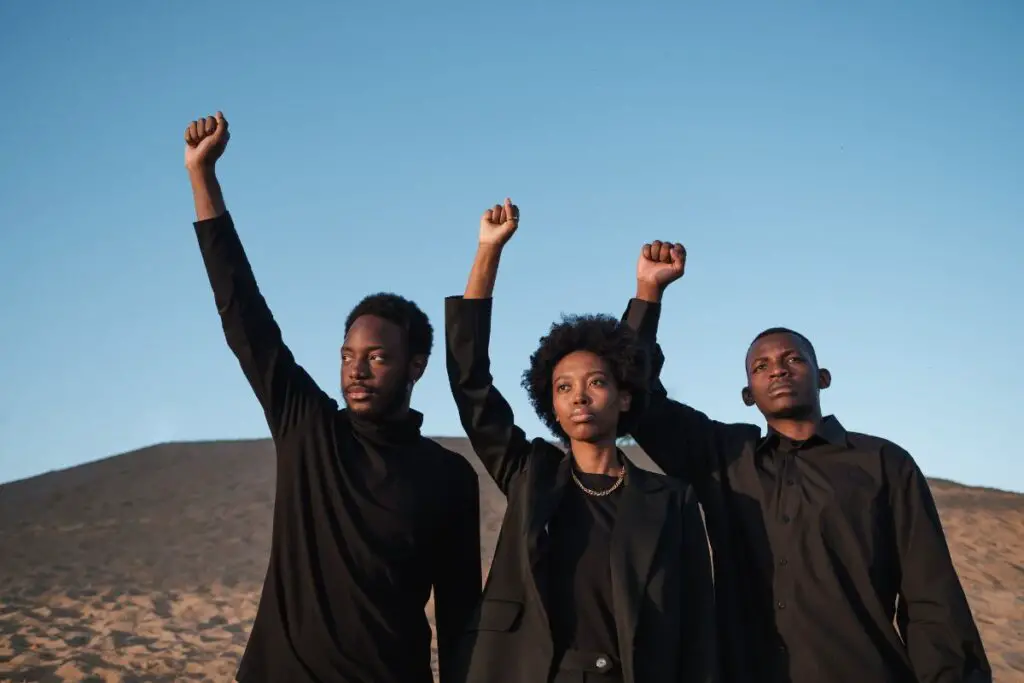
QUESTION: Are black people in the BIBLE?
ANSWER 1: When a Black man is found reading Scripture from the Old Testament, the first question that the New Testament asks him is, “Do you understand what you are reading?” (Acts 8:30) The Ethiopian asked him how he could do it, and he responded, “How can I, unless some man should guide me?” The problem is that all of us, whether Black or White, have been led astray in some way, and it is an honor for me to direct you to the inheritance of holy Black history that is written in “the Scripture of truth.” Because Black people were the backdrops that God used in the Old Testament to highlight his greatest acts, theologians and Bible teachers who exclude, explain away, diminish, or ignore the contributions of the Black people that God placed in Scripture might as well exclude the cross from Jesus Christ. This is because in the Old Testament, Black people were the ones who contributed. In regard to Pharaoh, the most powerful African king mentioned in the Old Testament, the Bible itself provides evidence of this by stating, “for this reason I raised thee up to make my name known throughout all the earth” (Romans 9:17).
The majority of the biblical text from the Old Testament is written on black backgrounds. There is no mention of an Ethiopia in the Garden of Eden that translates to “land of burnt faces,” and there is no “Ethiopian eunuch” for Philip to preach Jesus “unto” in the New Testament. This is in addition to the fact that Blacks are mentioned in the Bible (Genesis 2:13; Acts 8:27). There would not have been Hebrew slavery in Africa, and there would not have been a Promised Land of Canaan for Black people to take from Hebrews if it weren’t for the Black people who are mentioned in the Bible. There would be no Tower of Babel in Ham’s grandson’s kingdom of Babel, and an African princess would not have rescued Moses from the Nile if there were no Black kings in the Bible. Additionally, there would be no Passover holiday for Jews, and their liberator Moses would not have married an Ethiopian woman (Psalm 106:22; Numbers 12:1). Egypt would not be referred to as “the land of Ham” in the Bible if it were not for the presence of Black people in that region (Psalm 105:23, 106:22). If the Bible did not include Black people, there would be no book of Exodus to describe how the chosen people made their way “out of Africa.”
If there were no Black people in the Bible, there would be no Arabs or Philistines. This would mean that the books of the first and second Samuel, as well as the Philistine giant that David had to vanquish, would not be there (Gen 10:14). David would not have killed his proselyte Hittite-Canaanite soldier that had converted to Judaism in order to take his Canaanite-Gilonite wife that gave birth to King Solomon if it weren’t for the presence of Blacks in the Bible. Blacks in the Bible are referred to as “Blacks in the Bible” (2 Samuel 11:3). If it weren’t for the people of African descent who are mentioned in the Bible, the prophet Jeremiah likely would have been executed (Jeremiah 38:7). If the Bible did not contain references to black people, the tribe of Benjamin, which is known for its dark-skinned Hebrews, would not have survived, and Paul would not have been born (Judges 21:3-7; Acts 21:38; Philippians 3:5). There would be no Israelite tribes of Ephraim or Manasseh or any Hittites, Jebusites, Hivites, or other Canaanite tribes for Israel to conquer if it weren’t for the Blacks in the Bible.
If it weren’t for the presence of Black people in the Bible, Job wouldn’t have had to worry about his possessions being stolen, and there wouldn’t be a Canaanite apostle of Jesus named “Simon the Canaanite,” whose ancestry theologians of European descent try very hard to explain away, despite the fact that no apostles were descended from Japheth’s Caucasian lineage (Matthew 10:4). It would be just as revolutionary if black people were acknowledged in the Bible as it was when Jackie Robinson became the first black player in major league baseball. Robinson won the rookie of the year award in his first season and went on to become the league’s most valuable player in the following season. Watch as your way of thinking shifts as the history of Blacks in the Bible is revealed through the Word of God. Regardless of your nationality or educational level, the Bible will never again read the same to you.
ANSWER 2: We can say with a fair degree of certainty that yes, the Bible does mention black people, despite the fact that the Bible does not explicitly identify any person as being a person with black-skinned. Furthermore, there is no single individual in the Bible who has been singled out as having fair skin. The Bible does not make much of a point of discussing a person’s skin color, and the color of one’s skin has no bearing on the fundamental teachings of the Bible.
The narrative of the Bible takes place almost entirely in the Middle East, more specifically in Israel and the surrounding region. In these parts of the world, you won’t find many people who identify as “black” or “white.” The majority of the people described in the Bible are thought to have been of Semitic origin and would have had a complexion ranging from light to dark brown. At the end of the day, it does not make a difference what race the people in the Bible belonged to.
Some academics are of the opinion that Zipporah, Moses’ wife, was probably black because she was a Cushite (Numbers 12:1). Ancient people used the name Cush to refer to a region in Africa. Although the context suggests that the Shulammite’s dark skin was the result of her working in the sun, the Bible does not explicitly state that she was black (Song of Solomon 1:5). There are those who believe that Bathsheba, mentioned in 2 Samuel 11:3, was of African descent. There are those who believe that the Queen of Sheba who traveled to see Solomon in 1 Kings 10:1 was of African descent. It’s possible that Simon of Cyrene (Matthew 27:32) and “Simeon called Niger” (Acts 13:1) were both people of African descent. In Acts 8:37, there is a reference to an Ethiopian eunuch who was almost certainly black. There are approximately forty references to Ethiopians in the Bible; given that Ethiopians are black, we can safely assume that these are all references to people of African descent. Jeremiah, the prophet, pondered aloud whether or not an Ethiopian could alter the color of his skin. (Jeremiah 13:23) It seems reasonable to assume that Jeremiah is talking about people with dark skin.
Even though the majority of Bible scholars hold the belief that black people are descended from Noah’s son Ham (Genesis 10:6–20), we cannot be certain of this fact because the Bible does not explicitly state this. In every instance, the Bible remains silent on the topic of racial distinctions. God is not concerned about the color of our skin as much as he is with the condition of our hearts. The gospel is the “good news” for everyone. Everyone, from people who identify as black to people who identify as white and everyone in between is welcome to find salvation in Christ. By the grace of God, we are able to shift our attention away from the surface of the body and toward the essence of the person.
ANSWER 3: Historically, the Bible has played a pivotal role in Black people’s lives. The narrative of the Bible is mostly written in Israel and the Middle East, but it mentions Black people in several stories. This has caused some debate as to whether Black people are present in the Bible or not. It is also important to consider that the Bible is not explicitly written in any way to identify white people. The term “black” is often used in ancient Hebrew, Sumerian, and Akkadian language to refer to someone with a dark skin. In the ancient Hebrew text, black people are called Negroes. However, some scholars argue that Negroes were not within the purview of the biblical writers.
In the Bible, there is a history of Blacks, both in the Old Testament and in the New Testament. These histories are influenced by an ancient rabbinic method of interpretation known as Midrash. This method of interpretation is based on the socio-economic conditions of the time. The ancients did not have any problems with Black people. In fact, Black people in the Bible are mentioned in a very favorable manner. The evidence from Scripture and Egyptian tombs supports this claim.
According to the Bible, all people are descendants of Adam and Eve. But, there are some who argue that Black people are not descendants of Adam. They believe that blacks are part of a pre-Adamic race. Some of these writers assert that blacks are ancestors of Europeans. Some believe that Black people are descended from Noah and Ham, but that they were cursed by God. This view has been adopted by Jewish and Christian interpreters. In the United States, this belief in white supremacy was used to justify slavery. Some white Christians in the South believed racist tales about blacks in the Bible.
In the United States, Cain Hope Felder was one of the first black scholars to study the presence of Black people in the Bible. He earned a doctorate in biblical languages and literature at Columbia University and became the first national director of Black Methodists for Church Renewal. His research challenged generations of scholarship that ignored race in Scripture. He argued that white interpreters had erased black people from the text.
He is now an adjunct professor at Princeton Theological Seminary. He believes that a pluralistic approach to the Bible is necessary to correct “Eurocentric” interpretations. He believes that a deeper analysis of the texts will change the way readers think. He is one of 30 African Americans with a doctorate in biblical studies. He is also a member of the National Board of Directors of the National Black Baptist Fellowship.
There are three main readings of the Bible that involve prophetic interpretations. The first is a Noahite view. This view teaches that Ham was cursed and turned black because of Noah’s curse. The second is a British-Israelite view. This view teaches that all the descendants of Canaan are cursed with slavery.
